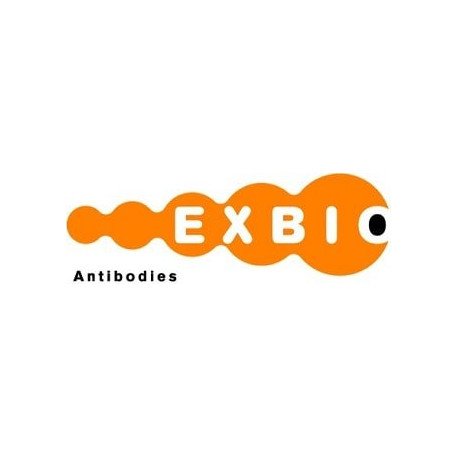Cart 0 Product Products (empty)
No products
To be determined Shipping
0,00 € Total
Prices are tax excluded
Product successfully added to your shopping cart
Quantity
Total
There are 0 items in your cart. There is 1 item in your cart.
Total products (tax excl.)
Total shipping (tax excl.) To be determined
Total (tax excl.)
Data sheet of Mouse Monoclonal to CD334 / FGFR4
| Brand | Exbio |
| Product type | Primary antibodies |
| Reactivity | Human |
| Clonality | Monoclonal |
More info about Mouse Monoclonal to CD334 / FGFR4
| Brand: | Exbio |
| Product no.: | 11-591-C025 |
| Product type: | Primary antibodies |
| Host species: | Mouse |
| Product name: | Mouse Monoclonal to CD334 / FGFR4 |
| Antigen: | CD334 / FGFR4 |
| Clonality: | Monoclonal |
| Clone: | 4FR6D3 |
| Isotype: | IgG1 |
| Immunogen: | NIH 3T3 cells transfected with full length human CD334_x000D_ |
| Format: | purified |
| Specificity: | The mouse monoclonal antibody 4FR6D3 reacts with CD334, the fibroblast growth factor receptor 4, which is an approximately 88 kDa receptor tyrosine kinase expressed in variety of tissues. _x000D_ |
| Categories: | Cytokine Signaling (Human), CD and Related Antigens (Human) |
| Concentration: | 1 mg/ml |
| Storage buffer: | Phosphate buffered saline (PBS) with 15 mM sodium azide, approx. pH 7.4 |
| Storage / stability: | Store at 2-8°C. Do not freeze. Do not use after expiration date stamped on vial label. |
| Background: | CD334 / FGFR4 (fibroblast growth factor receptor 4), a transmembrane tyrosine kinase, which is expressed in many tissues, such as in lung, kidney, muscle, heart, pancreas, intestine and other, acts as a receptor for several fibroblast growth factors, namely FGF1, FGF2, FGF6, FGF8, and FGF19. Interaction with these growth factors initiates in cell the signaling cascades leading to the mitogenesis and cell differentiation. Presence of CD334 Gly338Arg allele correlates with prognostic parameters in various cancer studies. CD334 plays multiple roles in the organism, including those of muscle regeneration, cholesterol-to-bile acid metabolism, or glucose homeostasis. _x000D_ |
| Purity: | > 95% (by SDS-PAGE) |
| Purification: | Purified by protein-A affinity chromatography |
| General references: | *Huang X, Yang C, Luo Y, Jin C, Wang F, McKeehan WL: FGFR4 prevents hyperlipidemia and insulin resistance but underlies high-fat diet induced fatty liver. Diabetes. 2007 Oct;56(10):2501-10._x000D_ , *Zhao P, Caretti G, Mitchell S, McKeehan WL, Boskey AL, Pachman LM, Sartorelli V, Hoffman EP: Fgfr4 is required for effective muscle regeneration in vivo. Delineation of a MyoD-Tead2-Fgfr4 transcriptional pathway. J Biol Chem. 2006 Jan 6;281(1):429-38._x000D_ , *Yang YC, Lu ML, Rao JY, Wallerand H, Cai L, Cao W, Pantuck A, Dalbagni G, Reuter V, Figlin RA, Belldegrun A, Cordon-Cardo C, Zhang ZF: Joint association of polymorphism of the FGFR4 gene and mutation TP53 gene with bladder cancer prognosis. Br J Cancer. 2006 Dec 4;95(11):1455-8._x000D_ , *Bange J, Prechtl D, Cheburkin Y, Specht K, Harbeck N, Schmitt M, Knyazeva T, Müller S, Gärtner S, Sures I, Wang H, Imyanitov E, Häring HU, Knayzev P, Iacobelli S, Höfler H, Ullrich A: Cancer progression and tumor cell motility are associated with the FGFR4 Arg(388) allele. Cancer Res. 2002 Feb 1;62(3):840-7._x000D_ , *Vainikka S, Partanen J, Bellosta P, Coulier F, Birnbaum D, Basilico C, Jaye M, Alitalo K: Fibroblast growth factor receptor-4 shows novel features in genomic structure, ligand binding and signal transduction. EMBO J. 1992 Dec;11(12):4273-80._x000D_ , *Partanen J, Mäkelä TP, Eerola E, Korhonen J, Hirvonen H, Claesson-Welsh L, Alitalo K: FGFR-4, a novel acidic fibroblast growth factor receptor with a distinct expression pattern. EMBO J. 1991 Jun;10(6):1347-54._x000D_ |
| Related products: | - Mouse Monoclonal to CD35 / CR1 - Mouse Monoclonal to CD34 - Mouse Monoclonal to CD34 / Mucosialin |
| Shipping condition: | Room temperature |


